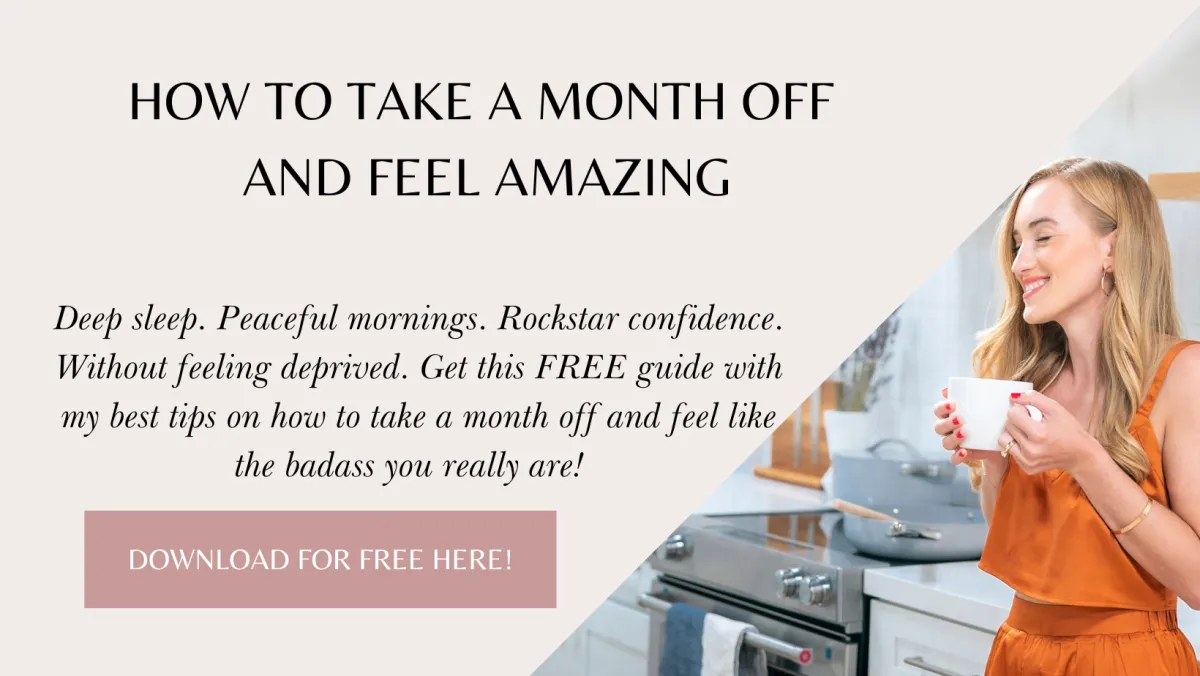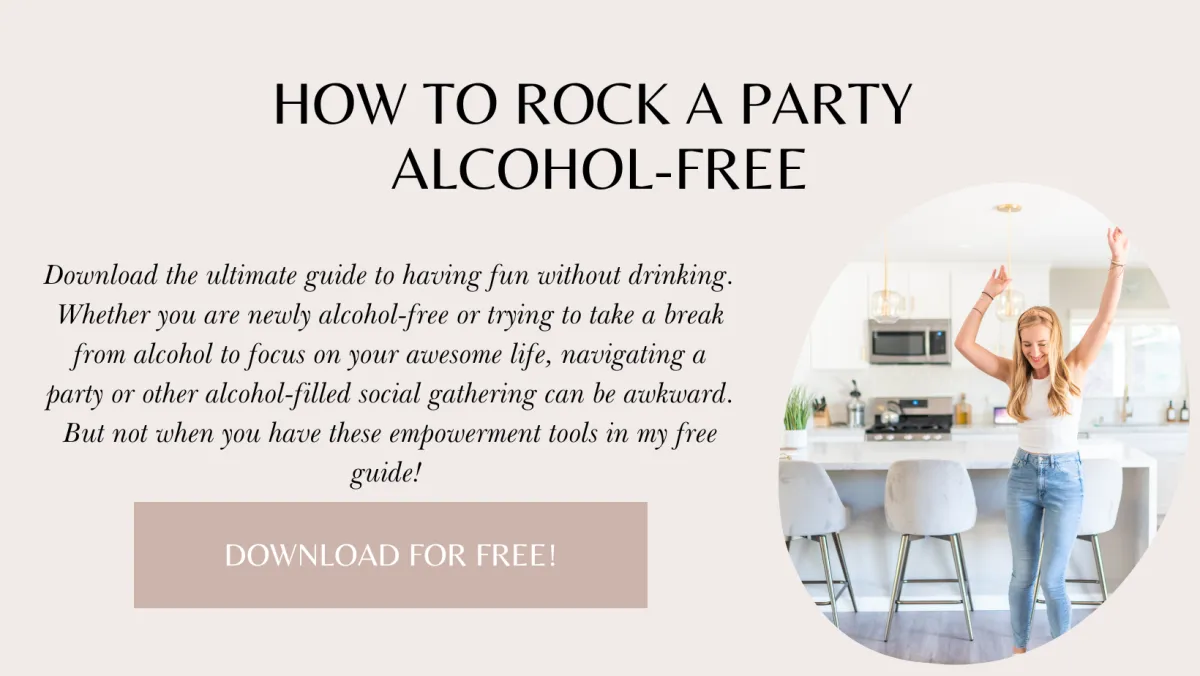The 3 Responses People Have When You Say “No Thank You” to Drinking

I don’t know about you, but I grew up with a stick code: “Normal adults drink.” I saw it all around me in movies and tv shows, and my own experiences throughout life. According to the code, the only reasons people choose not to drink is if they are pregnant or if they have a massive problem.
But that’s just not true. Not drinking alcohol is the healthiest thing you can do for your body and brain. You don’t have to claim a label to choose to be healthier, happier, and live a life more aligned with your values. That’s ridiculous.
I wanted to change my relationship with alcohol for years and years. The expectation to drink kept me setting arbitrary rules for myself about drinking instead of embracing the joys of an alcohol-free life. No drinks on week nights. No more than two drinks at a time. Take one weekend off every month. The mental gymnastics were exhausting. Everyone feels the pressure to drink. Some people even pretend to drink an alcoholic beverage when they are not, just to fit in!!! Let’s change the narrative. It's time to stand up to it. Be proud to be a non-drinker. When you’re a rebel about this, other people will be inspired.
Remember, if you are taking a break from alcohol, you are becoming a better person. You're becoming more adept at handling complex human emotions, you're putting on your psychologist hat, and you're learning that not everything someone says is about you, right? When it comes down to it, the response someone gives you when you tell them you're not drinking says far more about them than it says about you. Even so, it can be helpful to know what to expect. Here are the three responses people have when you say you’re not drinking.
The Neutral Response: Most People Don’t Care
The first is neutral or literally not caring. My clients are always pleasantly surprised that a lot of people don’t even notice that you're not drinking. It barely even registers with them. It’s such a small detail, like the color shirt you’re wearing that day. Most people won’t remember.
Think about this in a really subjective way. What is alcohol? It's a beverage. It’s a fermented beverage in a cup with ethanol in it. It's a beverage that we choose to drink or choose not to drink. Do people care about the food you eat? Do people care about the clothes you wear?
If I go to a barbecue and I'm a vegetarian and I eat salad instead of ribs, do people really care? It's just food on a plate. It's the same thing with drinking. It’s just a beverage. It wouldn't matter if you chose lemonade versus Sprite, right? So why do we think it matters whether we’re drinking alcohol or not? There is going to be a good portion of people who think the same way—who literally won't even notice. It won't be a big deal to them. And it's not a big deal to them because, more often than not, alcohol doesn't play a very important role in their life. They don't give it much thought. When you notice a lot of people don't care, it feels good. It’s a beautiful thing.
The curious Response
The second response you’ll get is a positively curious response. Sometimes, positive responses might not actually feel positive on the outset. What might happen is that someone will start asking questions when you say you’re not drinking. That might seem insensitive. It might seem like they’re prying. Maybe you’re not ready to answer that question, but oftentimes, it’s actually a positive response.
Why? People ask questions when they're interested. If someone asks you questions about why you're not drinking, and they're doing it politely, usually they're interested in taking a break from alcohol, too. They want to understand it better. Maybe they've thought about changing their relationship with alcohol for a few years and, when they meet someone who's doing it, they're inspired.
Let me tell you a story about this woman's book club in San Diego. For years, there was a women’s book club with the top who’s who of San Diego. It included all the high-level women in the area, like women who worked as directors, women who worked at biotech companies, and women who worked in prestigious government positions. They all met every other Wednesday for this book club. And they always had wine. It was this really boozy event in the middle of the week.
The book club had been going on for years when the leader of the book club decided to take a break from alcohol, and she loved it. So she decided to tell everyone at her book club, she won't be drinking anymore. She said there will still be wine if people want it, but she was also going to have some mocktails on hand.
When the leader said that, she was surprised to learn that a lot of people were actually relieved. A lot of people were relieved because nobody likes to drink on a Wednesday night and have to go to work the next day. We do it because we think it's expected of us or because we’re stuck in a pattern, but we don't actually like it. No one likes waking up on a Thursday going to meetings and doing work while not feeling their best. There was a collective relief in the group when this woman took a stand and was brave enough to say, “I'm not going to drink. You guys do what you want” and tons of other women decided to not drink anymore at these book clubs. Isn't that amazing? See the ripple effect that one person can have?
Let me clue you in on a secret. Most people who drink are not happy with their relationship with alcohol. Fifty-two percent of Americans want to drink less or not at all. So if you're not drinking, it's actually pretty likely that you're talking to someone who wants to drink less or someone who wants to stop drinking alcohol.
There are so many studies coming out about how bad alcohol is for us. Understanding that and understanding other people want what you have and that you might be inspiring them is a really cool way to start feeling a lot more confident about it.
The Negative Response
The third response you might get is a negative response. Someone might be judgmental or say, “Do you have a problem?” They might tell you they can control their alcohol intake, or they might try to pressure you into drinking by saying things like “just have one.”
These are all examples of negative responses someone might have and I know they don’t sound pleasant, but this is actually a lot like talking to the person who asks questions or has a positive response. When someone has a negative response to you not drinking, it's a sign that they have a complicated relationship with alcohol. It's a sign that they have insecurities about their own drinking.
When you don't drink, you are holding up a mirror to their behavior. Instead of them being able to just do whatever they want now they feel protective, like you might be judging them even if it's not true. It has nothing to do with you.
So what can you do? First, know that you don’t have to do anything. If that person isn't receptive to learning more about it or they don't ask any more questions, that's fine. Laugh it off, and just understand like they're not happy. If they have a negative response, maybe that will be an eye opener for them. Maybe they’ll realize they're also not happy with their relationship with alcohol. You're doing them a favor, essentially, because you're opening their eyes to what their true feelings are. People don’t respond negatively unless it brings up negative emotions for them.
Now these are the responses you can expect in social occasions. What do you do when you're at own house or you're dealing with someone who is close to you? What if it’s your friend or your partner or your parents?
With your partner, it's a lot deeper. It's a lot more nuanced. The main thing to remember is people are scared of change. People are scared that when you change, you're going to leave them behind or outgrow them. If your friends or your partner don’t understand at first, they're literally scared they're going to lose you. And that's on them, not on you.
But what you can do, especially if you love these people and you really want them in your life, is to show them that you still care about spending quality time with them even if you're not going to be drinking. If you and your partner used to drink a lot together, start inviting your partner to do different things with you. Start mountain climbing together. Invite them to go on a hike, go on a run together, or take a walk around the lake. That starts to help you guys bond in the different way and start to relate to each other in a different way. And talk to each other in a different way and get to know each other in a different way. It actually can be one of most magical things ever for your relationship. Same thing with your friends. Invite them to yoga class, invite them to go on a hike, or invite them to get coffee.
Those are the main three main responses people have. Once you know them, I think it also helps you understand these are all positive responses at the end of the day. Because you're a badass. You're a rebel. You are no longer choosing acceptance and belonging and making yourself sick and your soul sick in order to fit in.
You're showing others that there's a better way. You're showing them you can socialize without ethanol and hangovers. There is better way to live. If I saw that five years ago, it would have rocked my world. You are the change we literally need. Don't worry about what people think because their opinions don’t really matter. Laugh off peer pressure and understand that, if people are inquisitive, they are probably interested in taking a break from alcohol, too. If they have a negative reaction, they probably have a complicated relationship with alcohol, and you’re bringing that to their attention.
So, going into to your next social occasion, please be proud about it. Be confident. Remember you're not the only one who doesn't like how drinking feels. Statistics show most people want to change their relationship with alcohol.
I did a lot of research for my book, Euphoric: Ditch Alcohol and Gain a Happier, More Confident You, and it blew my mind that most people aren't happy with their relationship with alcohol. Most people want to drink less or not at all. A lot of people are going through this.
Know that if your friends drink regularly, they probably feel this way too. They might just not be as introspective as you. That makes you the intuitive one. You're the brave one. You're the role model. So kudos to you and keep going. Keep breaking the mold and being courageous. If you’d like to learn more about what to expect from taking a life-changing break from alcohol, you can get a copy of my book, Euphoric: Ditch Alcohol and Gain a Happier, More Confident You here. I'd love for you to check it out.






